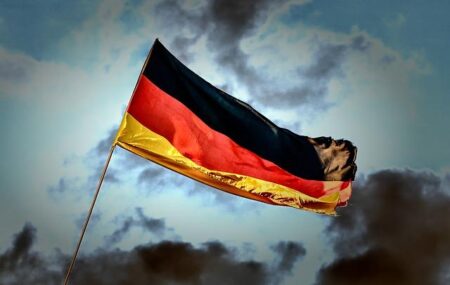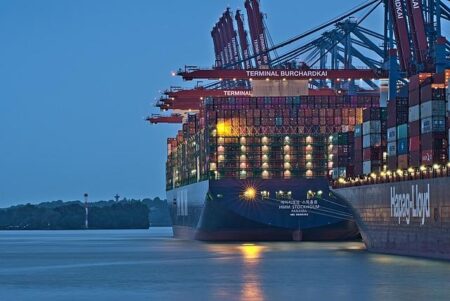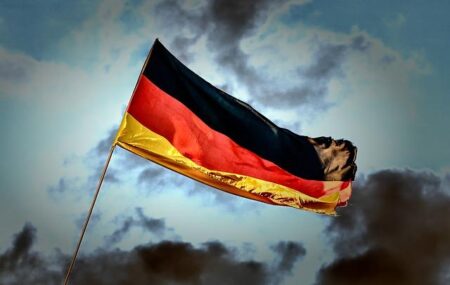Germany’s Finance Minister Merz spotlights encouraging signs of economic recovery, but the IMF warns that deep-rooted structural challenges and ongoing global uncertainties continue to restrain the country’s mid-term growth potential
Browsing: Germany
Germany’s smart washing machine market is on the rise, projected to skyrocket to an impressive $694.12 million by 2024, driven by a booming demand for energy-efficient appliances. This vibrant industry is gearing up for thrilling growth and intense competition through 2030
Germany’s police chief praised the “very good cooperation” with Morocco in combating crime and terrorism. This powerful partnership underscores the growing security alliance between the two nations, strengthening their united front against cross-border threats
Chelsea and Manchester United are locked in a thrilling race to sign Germany’s exciting midfield sensation, OuĂ©draogo. Both Premier League powerhouses are determined to snap up the promising young talent before the upcoming transfer window, insiders reveal
Germany has launched its cherished Christmas markets, this year with enhanced security measures in response to recent threats. Authorities have boosted police presence and implemented stricter checks to ensure a safe and festive atmosphere across cities nationwide
Germany is gearing up to invite bids for new gas-fired power plants this March, taking a bold step to boost energy security amid ongoing market turbulence, a government minister revealed to Bloomberg
19-year-old Assan Ouedraogo made a stunning entrance on the international stage, scoring for RB Leipzig in his very first appearance for Germany. This young talent showcased remarkable skill and promise, igniting excitement for what lies ahead in his burgeoning career
Germany is gearing up to make a powerful move by classifying date rape drugs as weapons in court, opening the door to much harsher penalties. This groundbreaking initiative seeks to strengthen legal defenses against drug-facilitated sexual crimes, Reuters reports
Former President Trump sharply criticized Ukraine for showing “zero gratitude” amid the ongoing conflict, while German officials warned that a deal to end the war is unlikely to be reached before Thursday’s fast-approaching deadline, escalating tensions further
Germany is preparing to ban the slogan “From the river to the sea” amid rising concerns that it stokes antisemitism. This decisive move aims to tackle hate speech linked to the Israeli-Palestinian conflict, sparking a fierce debate over freedom of expression
Germany, France, and UK leaders teamed up with Ukrainian President Zelenskiy in a pivotal call to explore a US-backed strategy aimed at bolstering Ukraine’s defenses amid the ongoing conflict, Reuters reports
KPMG’s latest report highlights Germany’s vibrant economy, featuring strong industrial output, steady export growth, and impressively low unemployment. Driving this momentum are key sectors such as automotive, technology, and renewable energy powering the nation’s success
The EU is ramping up its trade strategy toward China, fueled by growing worries over market access and fair competition. This shift echoes Germany’s strategic pivot, signaling a bold and more determined European stance
German Chancellor Merz is set to leave Brazil promptly after a recent comment that sparked controversy, Berlin officials confirmed. The statement reportedly ruffled President Lula’s feathers, intensifying diplomatic tensions
Brussels has taken a bold stand by launching infringement proceedings against Spain, Germany, and Latvia for failing to fully comply with EU firearms regulations. This decisive move underscores the bloc’s steadfast commitment to tightening gun control measures across its member states
Czech steelmakers are urging the government to roll out a support plan like Germany’s, aiming to shield the industry from skyrocketing costs and intense global competition, European Newsroom reports
The German National Tourist Board has launched its exciting 2024 roadshows across China, unveiling Germany’s iconic attractions, rich culture, and unforgettable travel adventures designed to inspire and captivate Chinese travelers
ADNOC’s acquisition of Covestro has just received final regulatory approval in Germany, clearing the path for this thrilling deal to advance. This milestone marks a significant leap forward in ADNOC’s bold journey toward global expansion in the chemical industry
Germany is leading the charge to secure the UK’s involvement in the EU’s colossal €150 billion defense fund, aiming to strengthen European security cooperation despite lingering Brexit tensions, Bloomberg reports
Germany champions the UK’s involvement in the EU’s €150 billion defense fund, emphasizing that united strength is key to boosting security. This marks an exciting new chapter in post-Brexit defense cooperation between Brussels and London




















